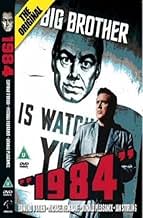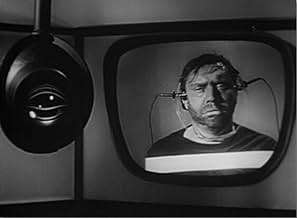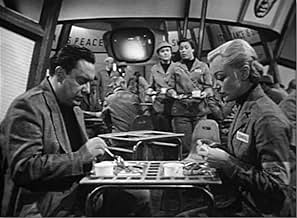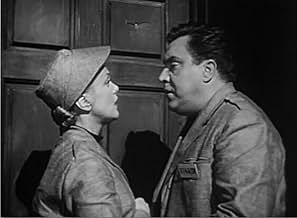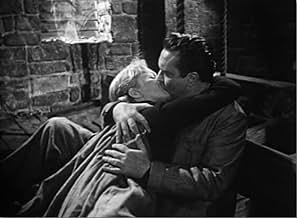IMDb RATING
6.9/10
4.3K
YOUR RATING
In a totalitarian future society, Winston Smith, whose daily work is re-writing history, tries to rebel by falling in love.In a totalitarian future society, Winston Smith, whose daily work is re-writing history, tries to rebel by falling in love.In a totalitarian future society, Winston Smith, whose daily work is re-writing history, tries to rebel by falling in love.
Donald Pleasence
- R. Parsons
- (as Donald Pleasance)
Kenneth Griffith
- Prisoner
- (as Kenneth Griffiths)
Barbara Cavan
- Woman
- (voice)
- (uncredited)
Walter Gotell
- Guard
- (uncredited)
Anthony Jacobs
- Telescreen
- (voice)
- (uncredited)
Barbara Keogh
- Special Woman
- (uncredited)
Bernard Rebel
- Kalador
- (uncredited)
- Director
- Writers
- All cast & crew
- Production, box office & more at IMDbPro
Storyline
Did you know
- TriviaSonia Orwell, widow of George Orwell, objected to the changed ending, and had this movie withdrawn from circulation.
- Quotes
O'Connor of the Inner Party: You will be hollow. We will squeeze you empty and fill you with ourselves, with love of Big Brother.
- Alternate versionsThere are two endings to this film. The UK version ends with a defiant Winston Smith and Julia being executed by the authorities. The US version is more faithful to Orwell's book and concludes with Winston and Julia being brainwashed into becoming loyal followers of "Big Brother."
- ConnectionsFeatured in Hollywood and the Stars: The Angry Screen (1964)
Featured review
Good, and I do really mean GOOD, dystopian Sci-Fi is the only (sub-) genre in cinema that occasionally manages to frighten me or make me feel uncomfortable. Titles such as "Soylent Green", "Z. P. G", or the more recent "Children of Men" are deeply disturbing not because we will be battling alien races or intelligent robots in the not-so-distant future, but because mankind itself made the planet unlivable. George Orwell, and his uniquely magnificent novel "1984", is probably the founding father of dystopian SciFi (although the influence of "Metropolis" is also unneglectable) and it's still one of the most horrifying tales ever written as far as I'm concerned.
Admittedly "1984" didn't turn out to be the phenomenal movie I secretly hoped it would be. It's an engaging, competently made, and absorbing transfer of Orwell's totalitarian nightmare from paper to screen, but some things are missing. I just didn't feel it. I didn't feel Big Brother's eyes penetrating in my back, I didn't feel the Inner Party's tyrannical madness, or their greed to own and control every human being's life. I didn't feel Winston and Julia's desperate desire to live in complete freedom. Perhaps the year of release, 1956, was still a bit too early to turn the novel into a motion picture. Director Michael Anderson somewhat fails to recreate the bleak and depressing atmosphere, as well as the dauntingly monotonous set-pieces, of a truly miserable dystopian world. 20 years later, however, Anderson would prove himself certainly capable of doing so with "Logan's Run". The 70s were just the ideal decade for dystopian Sci-Fi.
Of course, I would like to finish by underlining that "1984" is nevertheless a very good film, and worth tracking down for fans of the Sci-Fi genre, as well as George Orwell admirers. Several aspects are fantastic, notably the strong performances of the emotional Jan Sterling and the stoic Michael Redgrave. There are a handful effectively disturbing highlights as well, like the inspection rituals Winston has to endure in his own apartment, the public promoting of events like "hate-week" or the persona of young Selena Parsons, who has been so completely indoctrinated by Big Brother that she even becomes terrifying to her own neighbor and father (the stupendous Donald Pleasance in an early role).
Admittedly "1984" didn't turn out to be the phenomenal movie I secretly hoped it would be. It's an engaging, competently made, and absorbing transfer of Orwell's totalitarian nightmare from paper to screen, but some things are missing. I just didn't feel it. I didn't feel Big Brother's eyes penetrating in my back, I didn't feel the Inner Party's tyrannical madness, or their greed to own and control every human being's life. I didn't feel Winston and Julia's desperate desire to live in complete freedom. Perhaps the year of release, 1956, was still a bit too early to turn the novel into a motion picture. Director Michael Anderson somewhat fails to recreate the bleak and depressing atmosphere, as well as the dauntingly monotonous set-pieces, of a truly miserable dystopian world. 20 years later, however, Anderson would prove himself certainly capable of doing so with "Logan's Run". The 70s were just the ideal decade for dystopian Sci-Fi.
Of course, I would like to finish by underlining that "1984" is nevertheless a very good film, and worth tracking down for fans of the Sci-Fi genre, as well as George Orwell admirers. Several aspects are fantastic, notably the strong performances of the emotional Jan Sterling and the stoic Michael Redgrave. There are a handful effectively disturbing highlights as well, like the inspection rituals Winston has to endure in his own apartment, the public promoting of events like "hate-week" or the persona of young Selena Parsons, who has been so completely indoctrinated by Big Brother that she even becomes terrifying to her own neighbor and father (the stupendous Donald Pleasance in an early role).
- How long is 1984?Powered by Alexa
Details
- Release date
- Country of origin
- Language
- Also known as
- Neunzehnhundertvierundachtzig
- Filming locations
- Production company
- See more company credits at IMDbPro
- Runtime1 hour 30 minutes
- Color
Contribute to this page
Suggest an edit or add missing content


